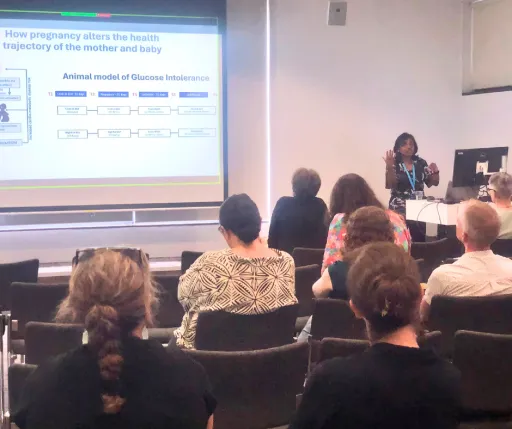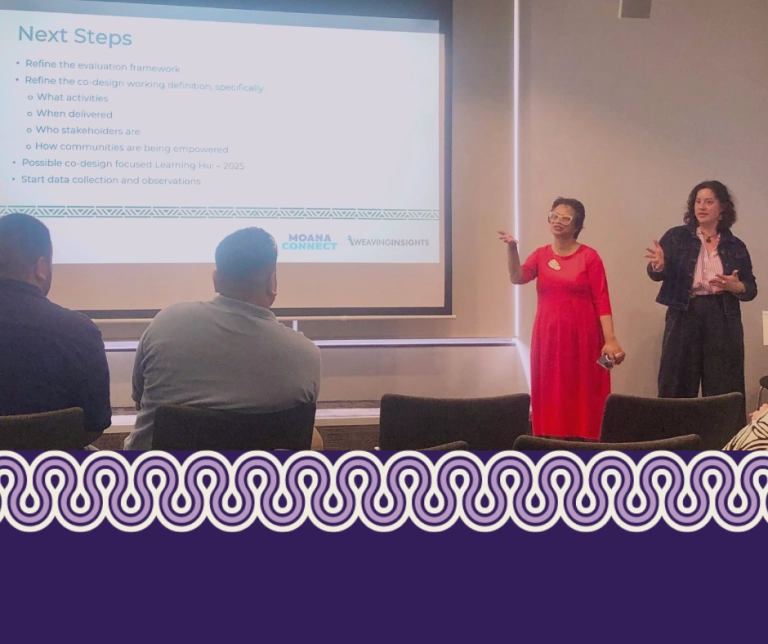Researchers share their wins, learnings, and next steps
Pūtahi Manawa researchers came together for our annual research update hui Monday, 9 December, at The University of Auckland. The hybrid hui was an excellent opportunity to share wins, learnings, and next steps and build on relationships. Researchers said they appreciated hearing from each other and found it to be a valuable occasion. Moana Connect and Weaving Insights shared evaluation insights on how our researchers work with Māori and Pacific communities.
New discoveries
Our community research has discovered what those living with heart disease actually need for improving heart health equity as well as new genes that may be causing heart disease and establishing a common driver of high blood pressure and high blood sugar for the first time. These novel discoveries are now ripe for translation and implementation to reduce the suffering from heart disease.
Co-design lessons
There were recurring themes from the key lessons learned during the collective co-design process.
Allow the process to occur in its own time: Meaningful and sustainable co-design takes time, which is determined by the community’s schedule, which researchers must adapt to. A research timeline becomes a suggestion rather than a fixed deadline.
Flexibility and agility: Researchers need to be flexible to meet the community’s needs, and they will benefit from acting fast when the community provides an engagement opportunity. Importantly, be ready to scratch what you know to get it right for the community you are engaging with.
Give back more than you take: Be prepared to bring in other professionals (non-researchers) to provide the information the community wants to receive during the process. If this isn’t possible, be prepared to clearly explain your scope as researchers to create realistic expectations of what participants can get out of the process before they agree to engage.
Sustainability and relationships: Leverage your networks to bring in people with other skills who can meet your community’s needs. Whakawhanaungatanga within your team allows you to discover and utilise each other’s skills beyond professional roles or titles.
Building your community’s capability ensures that the momentum gained through the co-design and research process sustains long-term positive impacts, extending beyond simply sharing research findings.

Refining, collaborating, and the search for sustainability
Ngahorihori (Nan) Wehipeihana, director of Weaving Insights, specialists in evaluation with a focus on Māori – whānau, hapū, and iwi, was pleased to see meaningful co-design taking place with both short and long-term potential positive outcomes for Māori communities.
Kahiwa Sebire, from Weaving Insights, spoke about the absence of a definition of co-design. She encouraged Pūtahi Manawa researchers to consider co-design principles and how their own research might contribute to refining a co-design working definition.
Erina Korohina, Lead investigator of the Te Ara Poutama Integrated Research Module and Kura Raumati co-lead, called for greater collaboration across the Integrated Research Modules to lessen the burden on the community and leverage their collective learnings to go forward together as a roopu.
Dr Karen Brewer, co-director Māori, and Soteria Ieremia, co-director Pacific, shared their respective leadership team strategies.
Professor Julian Paton, co-director, closed out the day with the key takeaway for researchers around sustainability.
"We have discovered changes that are making a difference. The challenge is to drive change through the healthcare systems both locally and nationally…. Once in the healthcare system, those changes should stick and be amplified nationally. We want to share the sustainability challenge with our communities to drive these equitable heart health outcomes."



